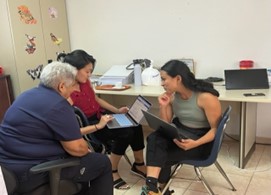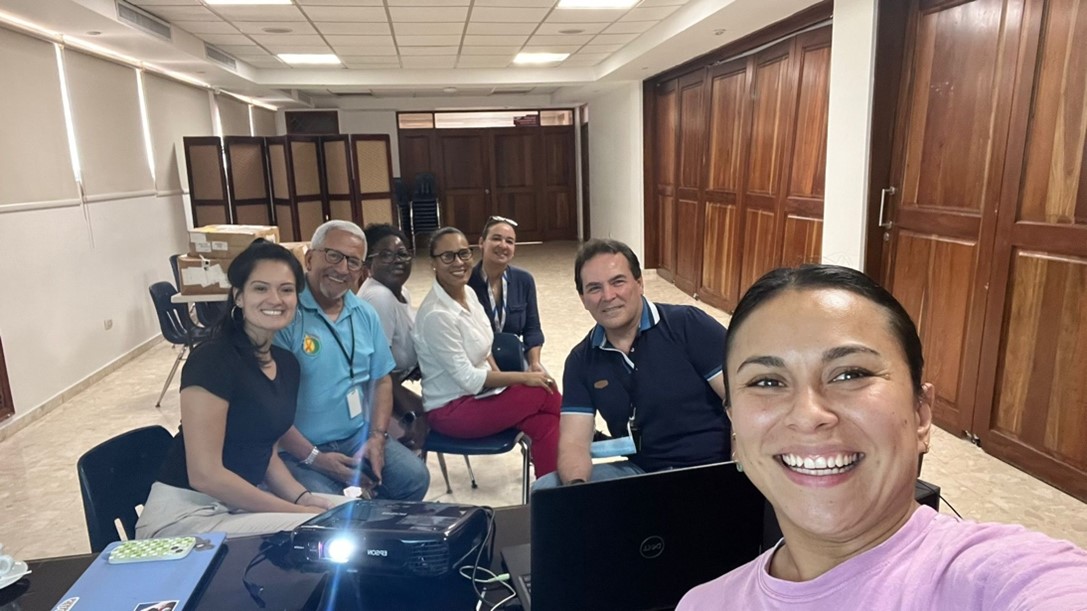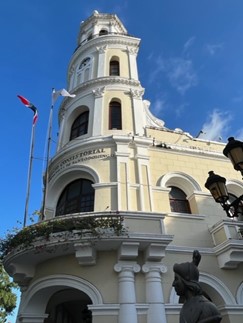As a public health professional and as a child of immigrants, I have always been drawn to diving into the diverse perspectives that shape different populations’ realities and, ultimately, their health outcomes. When the opportunity arose to embark on a project focused on interviewing and surveying HIV positive trans community in Santo Domingo, I knew it was a chance to engage in meaningful conversations and shed light on stories often overlooked – especially in the Latin American context. Now that I have finished my summer practicum with the Unidad de Vacuna e Investigación at the Instituto Dominicano de Dermatología y Cirugía de la Piel (IDCP), I have taken some time to reflect on the diversity and layered experiences shared with me by trans community members.
From the moment I stepped into this project, I was captivated by the resilience, strength, and diversity amongst the trans individuals I had the privilege of speaking with. Each person had a unique story to tell, shaped by their experiences, struggles, and triumphs. These stories painted a vivid picture of the challenges the trans community faces in a patriarchal society that often misconstrues, mistreats and marginalizes them. Machismo is rampant in Dominican culture, as is it is in all of Latin America, that is very much a remnant of the country’s colonization period. As one trans leader explained, that individuals – particularly men – who exhibit chauvinistic behavior are often called “Trujillista”. This term comes from the country’s brutal dictator that reigned between 1930 to 1961, Rafael Trujillo, referring to the belligerent behavior implemented by his armed forces at the time. It was fascinating to see how the country’s dark past informs the coinage of a term that oppresses such a marginalized community.
One of the most important aspects of this project, whether in qualitative interviews or administering surveys, was creating a safe and welcoming space for these vulnerable conversations – which often covered topics such as sexual/domestic abuse, drug use, and mental health. It was crucial to establish an environment where individuals felt comfortable sharing their thoughts, feelings, and experiences. We held the interviews and surveys in locations where participants felt secure, facilitated them through a consent process and assured them that their identities would not be tied to the information that would be shared with us. Many explained that their biggest fear was having their HIV status disclosed to other trans sex workers in the study, which could cause a domine effect that may trigger rival trans sex workers to tell potential clients and thus hindering their ability to secure customers.

psychologists, and MPH Practicum students.
Throughout the conversations, all participants shared annecdotes reflecting the preconceived notions and misconceptions Dominican society have against the trans community, particularly those that are HIV positive. It was disheartening to hear about the discrimination, stigma, and lack of compassion the community faces, typically perpetrated by their own family members, employers and law enforcement. Nonetheless, it was also inspiring to witness many of their determination to challenge these misconceptions and advocate for their rights through grass roots efforts. What struck me the most was the sense of responsibility of older trans women to give back and carve a path for the younger generations of trans women. Several community leaders I spoke were all involved some form of capacity building – supporting local trans NGOs through health education, political advocacy, or vocational training efforts. All shared how there is a dire need to equip trans women, at a young age, with education as their main armor to be used against the patriarchy. Despite the hardships the community endures, there is overwhelming pride in the visibility of trans women that continues to grow due to the growing presence of trans-serving NGOs in the area such as TRANSSA and COTRAVETED. These organizations are committed to unifying the community, empowerment, and personal/professional development opportunities for LGBTQI+ individuals in the DR.

The experiences and stories shared during my interviews and surveys underscored the urgent need for advocacy, education, and awareness. It is the responsibility of the Dominican government to give legitimacy and a platform to amplify the voices of trans women, challenge stereotypes, and work toward creating a more inclusive and accepting society. I am immensely grateful for the opportunity to have connected with the trans community in Santo Domingo. The Dominican Republic will always have a piece of my heart – from its kind people, delicious food, rhythmic music, balmy nights and the ice-cold Presidente beer shared with friends at the park during the sunset – it is truly a gem in the Caribbean. I can’t wait to go back and, not only see how the study has unfolded, but also to be enveloped by the lively feel of the country. As I continue to process the insights gained from this experience, I am reminded why I chose to become a public health professional. By lending our ears, hearts, and actions to those who often go unheard, we can collectively build a world where everyone’s story is celebrated, valued, and ultimately, respected.

-Tiffiany Portacio



